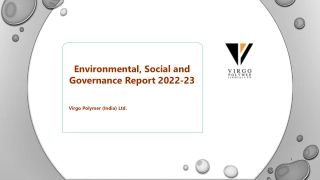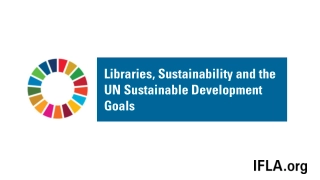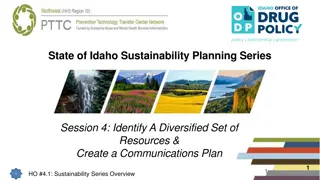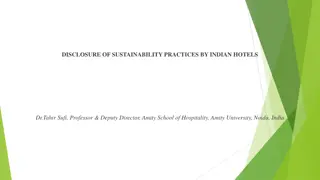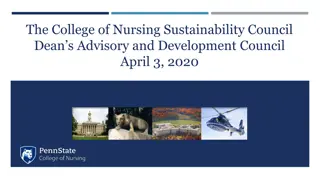Return to Traditional Foodways for Sustainability
The current industrialized food system is detrimental to both environmental and human health. By returning to more traditional and localized food practices, we can promote sustainability across social, economic, and environmental aspects. Emphasizing locally sourced foods can lead to improved community well-being and prosperity, while also tackling issues such as obesity and food insecurity.
Download Presentation

Please find below an Image/Link to download the presentation.
The content on the website is provided AS IS for your information and personal use only. It may not be sold, licensed, or shared on other websites without obtaining consent from the author.If you encounter any issues during the download, it is possible that the publisher has removed the file from their server.
You are allowed to download the files provided on this website for personal or commercial use, subject to the condition that they are used lawfully. All files are the property of their respective owners.
The content on the website is provided AS IS for your information and personal use only. It may not be sold, licensed, or shared on other websites without obtaining consent from the author.
E N D
Presentation Transcript
Return to a More Basic and Traditional Approach to Foodways TOMMY BENEDETTI
Background/Problem The health of the planet and its inhabitants is declining Current food practices are not sustainable (industrialized food system) Return to more traditional, localized food practices can help to benefit these issues and to promote all 3 pillars of sustainability
Industrialized Food System & Environmental Health Ease of current foodways leads to little-to no thought of how food is acquired, cultivated or reaches store shelves Pesticides, fertilizers, agrochemicals, and factory farming are detrimental to environmental and human health Industrial food system is responsible for the clearing of 70% of the worlds grasslands, 50% of savannas, 20% of tropical forests as well as 30% of greenhouse gasses, and 70% of annual water usage (Foley, 2011)
Local, Culture, and Sustainability Placing emphasis on locally cultivated and obtained foods has a multitude of benefits for all three pillars of sustainability Socially Economically Environmentally Remembering cultural origins of food can improve these issues in an abundance of ways
Today, the obesity rate in America is a shocking 33.9 percent almost twice that of the French. And Italians, who also celebrate a love of cuisine, boast an obesity rate as low as 9.8 percent (Tarr, 2016). Studies have shown that people who take the time to sit down and slowly enjoy a meal have more nutritious diets rich in fruits and vegetables (Tarr, 2016). Human Health Growing evidence has illustrated that the presence of community supported agriculture or community gardens has a positive correlation with both physiological and mental well-being (Gregis et. al, 2021).
Locally sourced food leads to more revenue, job opportunities, food security and community prosperity Local Economies and Connectivity A healthy, biodiverse landscape will not only benefit the ecosystem, but will also benefit the health of those living in it (Cote, 2016)
Conclusion To protect the biodiversity of the landscape, economies of local communities, and health of human beings, it is vital for local policy makers and the earth s inhabitants to grasp the importance of food s geographical and cultural origins as well as the potential benefits of more traditional, localized food practices.
References Tremblay, R., Landry-Cuerrier, M., & Humphries, M. M. (2020). Culture and the social-ecology of local food use by Indigenous communities in northern North America. Ecology & Society, 25(2), 293 318. https://doi.org/10.5751/ES-11542-250208 Willink, K. (2019). Food culture, relationality and the Slow Food Movement. Journal of European Popular Culture, 10(1), 61 73. https://doi.org/10.1386/jepc.10.1.61_1 Foley, Johnathan A. (2011). Can We Feed the World & Sustain the Planet? https://d2l.wcupa.edu/d2l/le/content/2911330/viewContent/23408684/View Lang, Tim. (2004). Food Industrialization and Food Power: Implications for Food Governance. https://d2l.wcupa.edu/content/enforced1/2911330-2205-ANT277- 01/Week%205/Lang_Food%20Industrialization%20and%20Food%20Power.pdf?_&d2lSessionVal=kcwu3Ixnp5pgNKtoC71RBIWWO&ou=2911330 DiGiovine, Michael A., Brulotte, Ronda L. (2014) Food and Foodways as Cultural Heritage. https://d2l.wcupa.edu/content/enforced1/2911330-2205-ANT277- 01/Week%2013/DiGiovineBrulotte2014_Introduction_Food%20and%20Foodways%20as%20Cultural%20Heritage.pdf?_&d2lSessionVal=wClQEeT53O8bV97nlP3k2LGml&ou=2911330 Cot , C. (2016). Indigenizing Food Sovereignty. Revitalizing Indigenous Food Practices and Ecological Knowledges in Canada and the United States. Humanities (2076-0787), 5(3), 57. https://doi.org/10.3390/h5030057 Lowitt, K., Levkoe, C. Z., Spring, A., Turlo, C., Williams, P. L., Bird, S., Sayers, C. D., & Simba, M. (2020). Empowering small-scale, community-based fisheries through a food systems framework. Marine Policy, 120. https://doi.org/10.1016/j.marpol.2020.104150 DiGiovine, Michael A. (2010) La Vigilia Italo-Americana: Revitilizing the Italian-American Family Through the Christmas Eve Feast of the Seven Fishes , Food and Foodways, 18: 4, 181- 208. https://www.tandfonline.com/doi/abs/10.1080/07409710.2010.529012 Tarr, Alexandra. (2016) Food and Culture From Local Relationality to Global Responsibility. Claritas: Journal of Dialogue and Culture, Vol. 5, No. 1, 52 62 https://docs.lib.purdue.edu/cgi/viewcontent.cgi?article=1141&context=claritas Gregis, A., Ghisalberti, C., Sciascia, S., Sottile, F., & Peano, C. (2021). Community Garden Initiatives Addressing Health and Well-Being Outcomes: A Systematic Review of Infodemiology Aspects, Outcomes, and Target Populations. International Journal of Environmental Research and Public Health, 18(4). https://doi.org/10.3390/ijerph18041943 Images https://www.pinterest.com/pin/280700989263401706/


